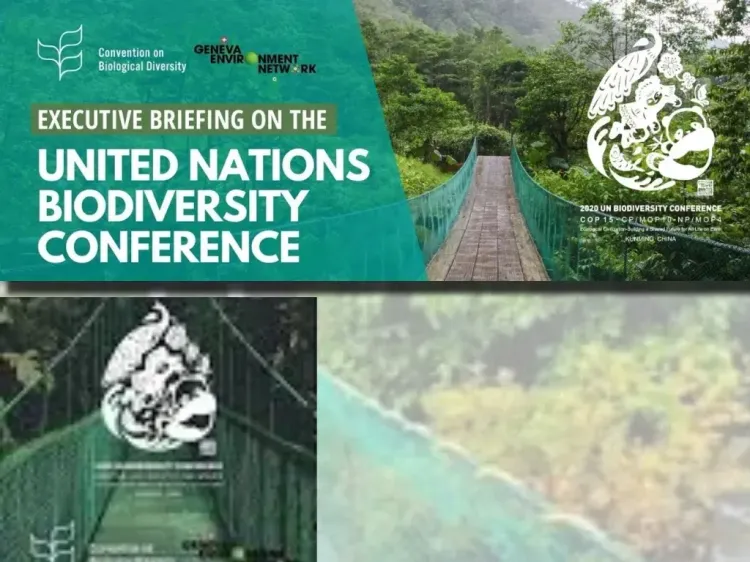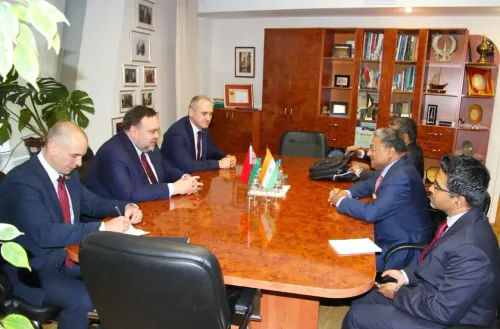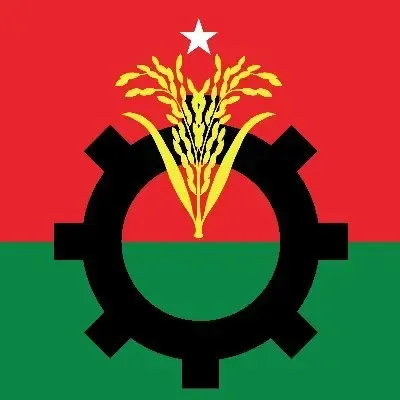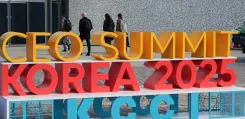UN Biodiversity Conference Set to Resume in February in Rome

Montreal, Nov 28 (NationPress) The UN Biodiversity Conference, suspended this month in Cali, Colombia, is scheduled to reconvene from February 25-27, 2025, in Rome at the headquarters of the Food and Agriculture Organization of the United Nations (FAO).
The bureau of the Conference of the Parties to the Convention on Biological Diversity agreed on Wednesday to hold resumed sessions for COP 16 and concurrent meetings of the protocols to tackle agenda items that were unresolved following the meeting's suspension due to a loss of quorum in the early hours of November 2.
'In the coming weeks, and during our gathering in Rome this February, I will collaborate with parties to foster the trust and consensus necessary to achieve harmony with nature, ensuring that the objectives and targets of the Kunming-Montreal Global Biodiversity Framework (KMGBF) translate into actionable results. Obtaining sufficient and predictable financing will be crucial to our initiatives, facilitating transformative changes for biodiversity while ensuring benefits for both communities and ecosystems,' stated Susana Muhamad, Colombia's Minister of Environment and Sustainable Development and President of COP16.
'The strong outcomes achieved at COP16, founded on a spirit of compromise and dialogue, demonstrate that multilateralism remains viable even in challenging circumstances,' remarked Astrid Schomaker, Executive Secretary of the Convention on Biological Diversity.
'Today's prompt agreement to wrap up our discussions in early 2025 signifies our commitment to maintain momentum and ensure the successful implementation of the KMGBF.
A significant focus of the resumed session will be a new resource mobilization strategy aimed at securing $200 billion annually by 2030 from various sources for biodiversity initiatives and reducing harmful incentives by at least $500 billion annually by 2030. The parties will also investigate the potential establishment of a global financing instrument for biodiversity, designed to effectively mobilize and distribute funding.
Current funding is derived from bilateral arrangements, private and philanthropic sources, along with dedicated funds like the Global Environment Facility (GEF), which includes its Global Biodiversity Framework Fund (GBFF) and the Kunming Biodiversity Fund (KBF).
Decisions will dictate how progress toward the implementation of the KMGBF will be assessed at COP 17. Parties will also contemplate including commitments from non-state actors, such as youth, women, indigenous peoples, local communities, civil society, and the private sector.
Finalizing the national reporting template, which encompasses headline indicators, was also part of the agenda.
Regarding the financial mechanism, parties are anticipated to endorse the achievements of the GEF, encourage additional contributions to the GBFF, and provide further guidance to the GEF in light of its upcoming replenishment negotiations.
Other agenda topics involve decisions on collaboration with other conventions and international organizations, the CBD's multi-year work program, and the adoption of final reports from COP 16, COPMOP 11 (Cartagena Protocol), and COPMOP 5 (Nagoya Protocol).
Prior to the suspension of COP 16 due to a lack of quorum, the conference reached groundbreaking agreements on global biodiversity protections and the implementation of the Kunming-Montreal Global Biodiversity Framework.
Governments consented to create the innovative 'Cali Fund', targeting industries such as pharmaceuticals, biotechnology, and agriculture—those profiting from Digital Sequence Information (DSI) on genetic resources—to share benefits with developing countries, indigenous peoples, and local communities.
According to the guidelines, large companies and other entities that commercially benefit from DSI are expected to contribute to the fund based on a percentage of profits or revenues.
Exempt from this requirement are smaller entities, academic institutions, and public research bodies utilizing DSI for non-commercial purposes.
The resources of the fund will predominantly benefit developing countries, aiding in the implementation of the KMGBF and National Biodiversity Strategies and Action Plans (NBSAPs). Furthermore, the funds will support activities led by indigenous peoples and local communities.









